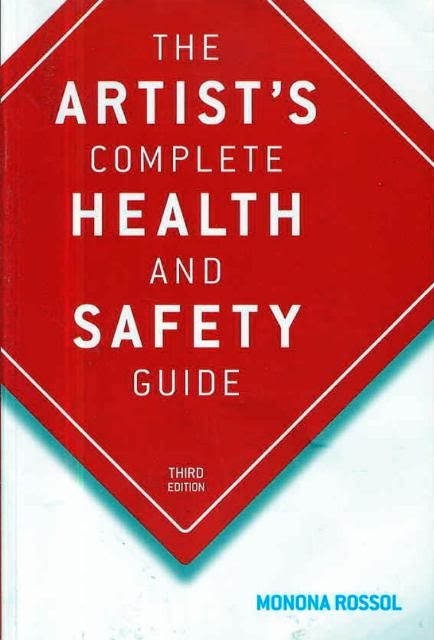The Artist’s complete Health and Safety Guide
Monona Rossol
Allworth Press
Copyright ©2001
ISBN 1-58115-204-3
Trade paperback
405 pages
Charts, Tables and few Line Drawings

This one is by the God Mother of arts, crafts and theater safety, she was ACTS founder. It is to bad that due to funding and grants cuts due to the economy the website has been shut down. As it was a great resource for any one in any of the areas it covered.
The book is sectioned into 4 main headings: Part I The Regulated Art World
Chapter 1 ; Health and Safety Laws
Chapter 2 ; Health Hazards and the Body
Chapter 3 ; Chemical Health Hazards and their Control
Chapter 4 ; Physical Hazards and their Control
Chapter 5 ; Identifying Hazardous Materials
Chapter 6 ; General Precautions
Chapter 7 ; Ventilation
Chapter 8 ; Respiratory Protection
They are mostly self descriptive as titles all but the most important one Chapter 5 As there are a lot of things and phrases and buzz words that manufactures put on labels to confuse or obfuscate the public or consumer.
Just because it is a natural product doesn’t mean it is safe after all asbestos, silica and dioxins are natural products. Also the phrases that are used
USE WITH ADEQUATE VENTILATION doesn’t mean use with a window or door open. It means that some toxic component becomes airborne during the products use. Ventilation required must be sufficient to keep the airborne substance below levels that are acceptable for industrial air quality.
BIODEGRADABLE, WATER-BASED, NATURAL, NONTOXIC CONSUMER PRODUCTS
This last one in the US and Canada is a great example the test last 2 weeks and if half the animals are alive after it. So following the above standards Powdered asbestos could be labeled nontoxic on the basis of this test. As all the animals will appear healthy after the two week tests, because cancer and asbestosis takes years to develop.
CITRUS OIL used in all manner of cleaners including had cleaners is made from citrus rinds. It contains D-LIMONENE which is natures pesticide, It kills flies so efficiently that it is registered with the EPA as an active ingredient in commercial pesticides. Add that to the fact that the citrus oil is contaminated with other pesticides from commercial fruit production
The American Industrial Hygiene Association set workplace standards for d-limonene that is more restrictive then that for turpentine, toluene and most other common solvents!
The chapter on ventilation and respiratory protection are filled with things you mom and employers never told you about the fine print in the descriptions of the two subjects.
Part II: Artist’s Raw Materials
Chapter 9: Solvents
Chapter 10: Pigments and Dyes
Chapter 11: Metals and Metal Compounds
Chapter 12: Minerals
Chapter 13: Plastics and Adhesives
Covers the basics on the above headings and general information. In chapter 11 for metals, it covers alloys, skin contact, corrosion products, dusts and powders, fumes, inhalation of metal particles, metal containing gases, metal compounds, other compounds. Exposure standards, toxicology of metals and compounds Threshold limit values and more in depth coverage of skin, nervous system, respiratory system, and reproductive effects.
It has a table that covers local and systemic hazards on the materials, and the TLV weighted for exposure for 8 hour day. Also list common chemical mixes and alloys that can have an effect.
PART III: Precautions for individual Media
Chapters 14 through 29 are paper making, glass, metal surface treatments, painting, welding, woodworking casting and smithing are just a few of them listed. Now they cover other hazards also, noise, radiation from light both UV and infrared, and bodily injury.
A lot of things people in the studio and shop sometimes take for granted. Or the always I’m only doing it for a minute, OUCH! Hey call 911!
PART: IV The Next Generation
Chapter : 30 Teaching Art
Chapter : 31 Reproductive Risks
Most will not be teaching in the general sense, but enough have younger kids, or grand kids that they enjoy showing and getting involved in shop/studio work. If you are he man or women and still consider yourself bullet proof. At least take a moment and think of the youngins!
It finishes up with sources, government agencies, standard organizations, commercial sources and reference list, a glossary and index.
If you are only going to get one book as a shop/studio source then I will say that this one has it all. It truly lives up to its name.